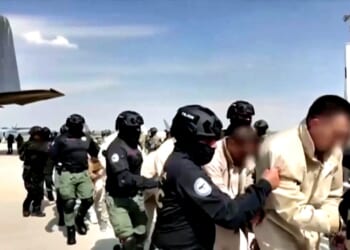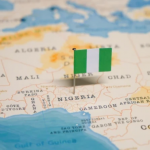It is unclear if the “Bolivarian Militia” would actually pose a threat to US forces—but they might be enough to make the Trump administration reconsider a land invasion.
The government of Nicolás Maduro in Venezuela has publicly announced very large numbers of civilian militia enrollments in recent months, tied to claims of the US threat. In August, Maduro claimed that the country was activating 4.5 million members of their ideological “Bolivarian Militias,” which is basically a paramilitary force that will supposedly be used to fight a guerrilla insurgency against any US forces deployed to fight in Venezuela.
Recent posts on social media indicate that Maduro is claiming that at least three million Venezuelans have taken up arms.
Venezuela Is Preparing for an American Invasion
This, of course, is larger than anything that we saw in the run-up to the Iraq War. Remember, before the United States invaded Iraq in March 2003, there was real concern that Saddam Hussein’s infamous Fedayeen Saddam army or irregular forces would cause real headaches for the advancing Americans.
That never came to fruition. Yet the Fedayeen were mobilized in the eleventh hour, and they never possessed the numbers that these Bolivarian militias appear to possess.
CBS News argues that the Venezuelans were exaggerating the number being bandied about on international social media apps. Instead, CBS asserts that the real number is closer to around 343,000 militia members. That’s still more than what Saddam had at his disposal. Moreover, it is far larger of a force than what the Americans have arrayed against Maduro’s regime.
Caracas understands fully that the Americans are poised to do more than just strike boats allegedly serving the region’s cartels. All that is a prelude to a much larger military operation. What’s more, Maduro is keen enough to see that the Americans are not merely interested in escalating their military operations only against Venezuela’s cartels. Instead, the anti-cartel operations are a backdoor ploy toward full-blown regime change.
This explains why not only Maduro is ramping up his militias, but the Russians are plying Venezuela with massive numbers of new weapons, platforms, and even deploying nearly 200 of their Wagner Group mercenaries to the country.
Is the Venezuelan Militia Really a Threat to US Troops?
Of course, there are many questions around the combat effectiveness of this Bolivarian militia. Especially in the face of well-trained and equipped US forces. At some point, though, sheer numbers, paired with a canopy jungle environment, could make operations for the smaller US forces more complicated than most are realizing.
Importantly, though, many Venezuelans are apparently uninterested in fighting despite the mobilization order. At the same time, it is essential that Americans understand that even if everything goes exactly according to plan, any regime change mission directed against Venezuela would result in a “you break it, you own it” situation.
Sure, Trump, who is a savvier operator than former President George W. Bush ever was when it comes to utilizing hard American power, might not buy into the argument that he is responsible for rebuilding Venezuela after decapitating the regime.
If, however, he lacks a real plan for postwar stabilization then it will potentially convert Venezuela from a threatening—albeit weak—regime to a Latin American version of Libya. Or worse, it might become a vassal state (even more than it already is today) of China and/or Russia, either of which might step in to rebuild the country following US military operations.
What Is America’s Strategic Intent in South America?
Trump said he wanted to restore US military dominance in the Western Hemisphere; that he wanted to uphold the Monroe Doctrine, a key (albeit dangerously ignored) tenet of US foreign policy going back to the earliest days of our republic. The 47th president is understandably upset with Venezuela because of how it has become a perennial thorn in America’s side in its own hemisphere.
Indeed, Caracas’ alliance with China, Russia, and even Iran are among the reasons for why the Trump administration seeks to destroy the regime.
Yet, destroying the Maduro regime only to see it become a fuller vassal of either China and/or Russia is certainly not in America’s interests. The whole goal of this mission against Maduro would be, ostensibly, to diminish the influence of China and Russia in the region. Not see that influence grow following Maduro’s ouster.
Plus, it has been decades since US forces have been made to fight such a conflict. Most US forces and equipment are geared toward fighting in desert terrain or the forests of Europe. Reverting to jungle warfare is a most unwelcome reality, given the history of US military operations in that environment. Then again, if there is any real concern about war with China erupting any time soon, this might give US forces and equipment real-world experience fighting such a campaign.
While it is likely the United States could defeat Venezuela rather quickly in a conventional war, it is a great unknown as to whether an insurgency would be as destructive to US forces as was the insurgency in Iraq following America’s invasion there, or if the Financial Times is correct when they assessed last month that Maduro’s “call to arms falls flat.”
Trump is right to want to restore US primacy in the Western Hemisphere. He just might be going about it incorrectly.
About the Author: Brandon J. Weichert
Brandon J. Weichert is a senior national security editor at The National Interest. Recently, Weichert became the host of The National Security Hour on America Outloud News and iHeartRadio, where he discusses national security policy every Wednesday at 8pm Eastern. He is also a contributor at Popular Mechanics and has consulted regularly with various government institutions and private organizations on geopolitical issues. Weichert’s writings have appeared in multiple publications, including The Washington Times, National Review, The American Spectator, MSN, and the Asia Times. His books include Winning Space: How America Remains a Superpower, Biohacked: China’s Race to Control Life, and The Shadow War: Iran’s Quest for Supremacy. His newest book, A Disaster of Our Own Making: How the West Lost Ukraine is available for purchase wherever books are sold. He can be followed via Twitter @WeTheBrandon.
Image: Shutterstock / StringerAL.


















